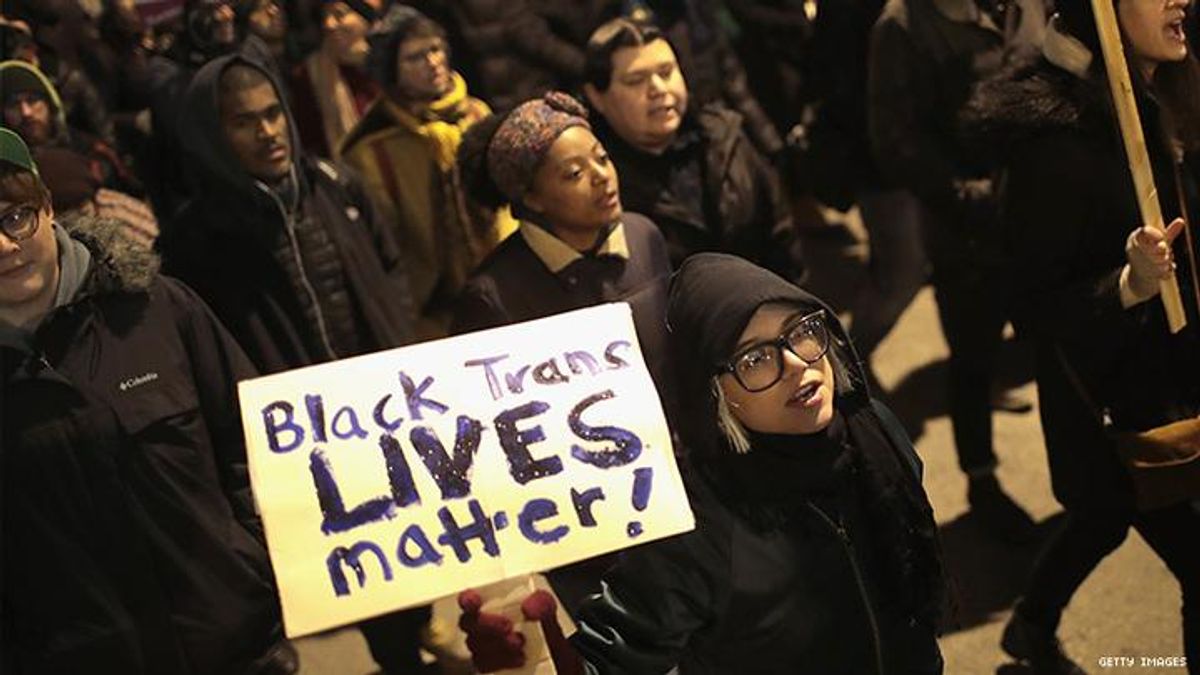Crime
157 Trans & Gender Nonconforming Americans Have Been Killed Since 2013

We’re living in a crisis, according to data analyzed by the Human Rights Campaign.
November 20 2019 10:29 AM EST
May 31 2023 4:35 PM EST
By continuing to use our site, you agree to our Private Policy and Terms of Use.

We’re living in a crisis, according to data analyzed by the Human Rights Campaign.
The Human Rights Campaign doesn't mince words in its new report on violence against transgender Americans.
"At this moment, transgender women of color are living in crisis," the report begins. "Over the past several years, more than 150 transgender people have been killed in the United States, nearly all of them Black transgender women."
The report is entitled "A National Epidemic: Fatal Anti-Transgender Violence in the United States in 2019," and it documents both the harrowing threats that trans people face, as well as solutions that could save lives -- provided that the political will can be mustered.
So far this year, the Human Rights Campaign estimates that there have been 22 known trans victims of fatal violence (although those numbers vary). Of them, 91 percent were Black women, 81 percent were under the age of 30, and 68 percent lived in the South. The danger of being subject to transphobic violence often translates into trans people facing higher rates of discrimination, poverty, homelessness, and violence.
But the reality may be worse than these numbers suggest: HRC notes that data collection is often limited regarding violence against queer people, with many incidents going unreported and many victims misidentified.
Given those challenges, HRC has identified 157 trans and gender-nonconforming people who were victims of fatal violence in the U.S. since 2013. They examined those incidents to identify trends in demographic data and in laws protecting queer people (or the lack thereof). The overwhelming majority of people impacted were women, the national LGBTQ+ advocacy group found, and overwhelmingly people of color.
Florida and Texas tied for the most number of incidents, with 16 a piece since 2013. They were followed by Louisiana with 13, California and Ohio with 12, and Maryland with 11. Baltimore was the most dangerous reported city, with seven incidents; Cleveland and Philadelphia had 6; and Atlanta, Detroit, Jacksonville, and Los Angeles had five.
Violence was highly correlated with poverty, with 90 percent of deaths occurring in areas with a poverty rate above the U.S. average. Poverty is a particular problem in the United States, with a relative poverty rate of around 18 percent compared to under 10 percent in countries like Denmark and Sweden.
The United States is also particularly deficient when it comes to legal protections. Existing federal hate crime protections, the study found, are severely limited when it comes to LGBTQ+ people, and only apply in select circumstances. Most hate crimes are investigated at the state level, and only 20 states have laws addressing hate or bias crimes based on sexual orientation and gender identity.
It's crucial that those laws be expanded, the HRC report explains, because about 82 percent of victims are killed in states lacking inclusive hate crime protections.
In addition, the criminalization of sex work can worsen violence against trans people. About 90 percent of trans people engaging in sex work report physical abuse by police, leaving them with few options when they need protection. Of the 157 cases the report examined, only six percent were investigated as hate crimes. What's more, about 80 percent of victims were misgendered by police or media.
Gun violence is a contributing factor as well, the report found. About half of the victims HRC examined knew their attacker, and two-thirds of the incidents involved a firearm.
The report concludes with an array of recommendations. Anti-trans violence is known to be exacerbated by several factors, particularly stigma and denial of opportunity. Ending the cycle of violence requires that communities diminish stigma throughout outreach and inclusion, as well as elevating trans and non-binary voices. More states need nondiscrimination and hate crime laws, and more schools need inclusive education.
In addition, more needs to be done to eliminate barriers to health care, education, housing, and job opportunities, which disproportionately disadvantage trans people.
The report also recommends the recriminalization of sex work, already underway in more progressive countries and a handful of communities in the U.S.
None of these solutions is achievable overnight, of course. They'll require a concerted and well-funded long-term effort by LGBTQ+ nonprofits like HRC, as well as local communities around the country.
"These communities and organizations... are often vastly under-resourced and under-recognized," the report concludes. "Together -- transgender and non-binary people and cisgender allies -- we can all work together to uplift and empower transgender and non-binary communities across the country in the fight for lasting change."
RELATED | How We Can End the Violence Against Trans Women of Color